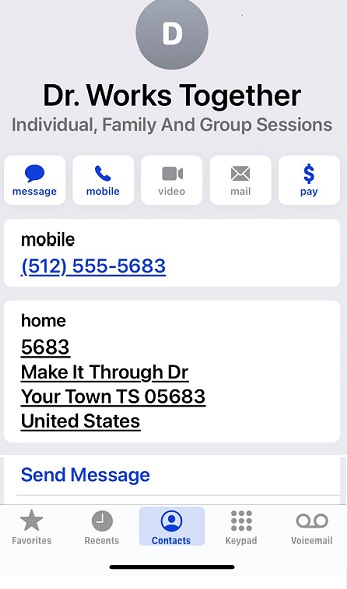What Post Adoption Services Are Provided?
See all of the tabs below for examples of the Post Adoption Services provided
DFPS does not authorize Post Adoption Services; they may however refer families that have adopted a child who is under the age of 18. Referrals are made to the region's contractor who verifies the family's eligibility. Delivery and maintenance of the Post Adoption Services program is the responsibility of the contractor.
To refer a family for Post Adoption Services, the worker provides the adoptive family with the contractor's:
- Name,
- Address, or
- Telephone number and
- any pertinent case information such as reason for referral and/or CPS involvement.

Workers provide children and their adoptive families with post adoption services, based on the:
- Child's and the family's current needs and level of functioning.
- Services that the child and family have received in the past.
- Resources available to them now.
Casework includes, but is not limited to:
- Administration.
- Planning.
- Coordination and delivery.
Contractors must develop a sound, written service plan for each child and family that the contractor serves (except if the family is only attending support groups).
The service plan must:
- Be based on a thorough assessment of the needs of the child and the family.
- Identify the services that will be provided to the child and family.
- Specify how and when each service will be provided.
Contractors must review and revise the service plan as often as necessary to reflect changes and must revise the service plan at least every six months or at least every three months if the child is in residential treatment.
Any member of an adoptive family or a prospective adoptive family may participate in a contracted or subcontracted support group.
Contractors must ensure that adoptive families and children have access to support groups that can help them deal with issues related to adoption and caring for children with special needs.
Contractors can meet this requirement by:
- Organizing and running support groups themselves.
- Subcontracting with other parties to organize and run support groups.
- Referring clients to support groups that already exist in the community.
Either directly or through subcontractors, each contractor must provide adoptive parents with opportunities to participate in parent-training programs designed to:
- Improve the parents' skills in raising and communicating with their children.
- Increase the parents' knowledge of child development.
- Increase the parents' knowledge of the effects and dynamics of physical, emotional, and sexual abuse and neglect.
- Inform parents of specialized methods of behavior management and discipline.
- Increase parents' awareness of special issues related to adoption.

CPS contracts for post adoption counseling to address therapeutic and behavioral issues arising from:
- An adopted child's history of abuse or neglect, including the child's removal from his home and placement into substitute care.
- An adopted child's physical, mental, or emotional disabilities.
- An adoptive family's difficulties in coping with an adopted child's history of abuse, neglect, or disabilities.
Either directly or through subcontractors, each contractor must offer the following post adoption counseling services:
- Diagnosis and assessment, including:
- Psychiatric
- Psychological
- Neuropsychiatric
- Neuropsychological
- Developmental testing, evaluation, and interpretation
- Individual counseling.
- Group counseling.
- Family counseling.
- Day treatment, consisting of intensive short-term professional treatment based on a professionally developed treatment plan.
- Short-term therapeutic or special skills camping for as long as six weeks.
Respite care services are child-care services provided for a brief specified time to families that have adopted children with special needs.
Respite care may be provided:
- For all or part of a 24-hour period.
- Either in or out of the home.
- For as many as 60 days every 12 months.
Respite care must be provided to prevent or help resolve a family crisis or address a problem whose solution is critical to the family's healthy functioning. Respite care must also be included in the adoptive family's service plan.
Some examples for respite care are:
- A member of an adoptive family suffers from a severe illness.
- A child with a disability requires extraordinary care, and the adoptive parents need occasional relief.
- An abused child or child with a disability needs continuous care during a period of crisis or recuperation, and the parents cannot stay with the child around the clock.
- An adoptive family is either in crisis or experiences overwhelming stress that will lead to a crisis, and respite care will help to resolve the crisis or relieve the stress.
Each contractor must provide specialized or intensive therapeutic care to adopted children who need and qualify for it as long as funds are available. The contractor will provide the care directly or through subcontractors.
To qualify, a child:
- Must be expected to be able to return home and function in the adoptive family within 12 months.
- Must be ineligible for treatment in a state hospital or state supported living center.
- Must have an initial service level of Specialized or Intense.
The child's adoptive family must participate in family treatment over the course of the child's stay in residential care.The eligibility period for residential therapeutic care is limited to 12 months after adoptions however, the expectation is that the child will only be in out of home care for 6 to 9 months. The associate commissioner for CPA may extend an adopted child's eligibility under specific circumstances.
For more information see the DFPS handbook at the following link:
http://www.dfps.state.tx.us/handbooks/CPS/Files/CPS_pg_8412_6.asp
The contractors provide crisis intervention services to all adoptive families including a helpline and on-call support.


* Availability of these services are dependent on funding and the individual child and family situation.
